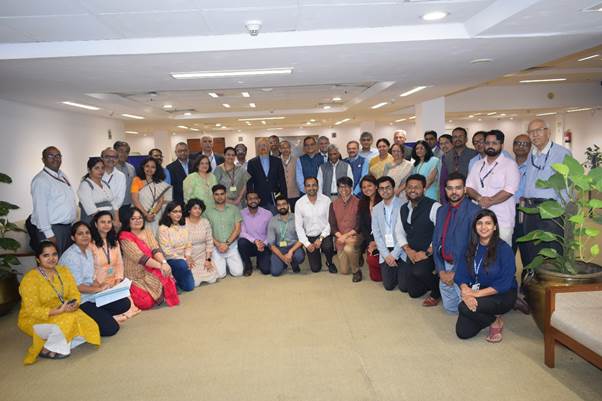New Delhi: Principal Scientific Adviser (PSA) to the Government of India and the Chairperson of the Empowered Technology Group (ETG) Professor Ajay Kumar Sood convened the first meeting of the Technology Advisory Group (TAG) for the ETG today at Vigyan Bhawan Annexe.
The meeting brought together TAG members, ETG members, key government officials, and experts from academia to discuss priority areas of scientific research and technology development particularly in carbon capture utilisation and storage, alternate battery technologies, and Artificial Intelligence.
Addressing the TAG meeting, Professor Ajay Kumar Sood said, “Empowered Technology Group is a forum to identify the most pertinent scientific challenges before the country and discuss the most suitable technologies which should be adopted. Some of the technologies might be contemporary, while some are futuristic, which would allow us to become technology ready for the future. TAG will help ETG in brainstorming and actualising ideas on how country’s technology needs should be met.”
Dr. Preeti Banzal, Adviser at the Office of the Principal Scientific Adviser, gave an overview of the constitution of the ETG and the constitution of TAG as part of ETG’s mandate.
Since the inception of ETG in February 2020, 50 ETG meetings have taken place, in which a total of 89 R&D proposals from 26 ministries have been evaluated, and 108 subject matter experts have been consulted on these proposals.
Dr. S.S.V. Ramakumar, Director (R&D), Indian Oil Corporation Limited (IOCL) delivered a presentation on carbon capture technology and its utilization and storage in the Indian context. Dr. Ramakumar suggested to look into developing a robust policy framework for carbon trading and carbon credit because of intended decarbonisation of industries globally.
The session concluded with a productive discussion, exploring collaborative opportunities between different academic and research institutes, and industries through innovation clusters around industries from major CO2 intensive sectors like steel, cement, fertilisers, etc. Need for further studies on proper sequestration methods was highlighted.
Prof K. Vijayamohanan Pillai, Professor & Chair, Chemistry Dean (R&D), Indian Institute of Science Education and Research, Tirupati delivered a presentation on alternate battery technologies like sodium ion, metal air and solid-state batteries and their potential for replacing lithium-ion based batteries. Cost-effective solutions for alternate battery chemistry and recycling technologies for batteries were also discussed.
Debjani Ghosh, President, NASSCOM gave a presentation on Artificial Intelligence as the new frontier of economic growth. It was discussed that there should be focus on building large foundational models, creating mega AI compute infrastructure, capacity building, and data unlocking.
The Chair invited the distinguished TAG members and invited experts to share their insights and recommendations to strengthen the research and development ecosystem in the country.
Developing a common governance and implementation model for providing technical support to these niche areas was also proposed.
Scientific Secretary Dr. Parvinder Maini gave a succinct summary of the three technical sessions. The meeting concluded with the closing remarks by the Chair. In his closing remarks, Prof. Sood highlighted the importance of taking consolidated efforts in actualising the ideas discussed during the TAG meeting and ensuring that the mission of constituting TAG is fulfilled.


